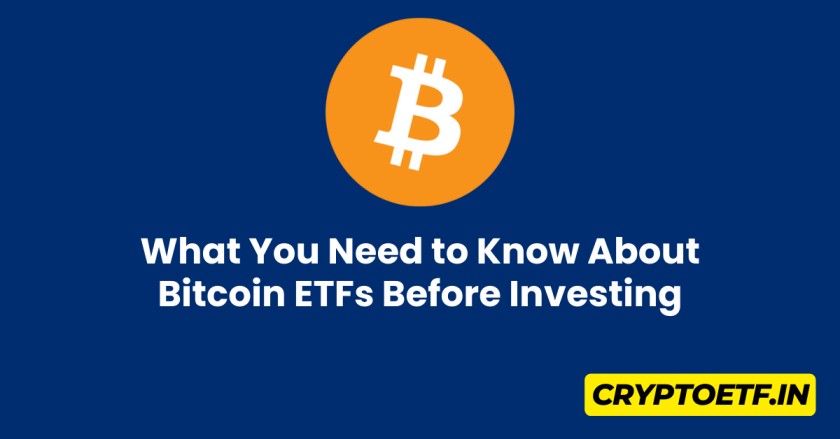Bitcoin Exchange Traded Funds (ETFs) have recently been a subject of intense discourse in the realm of investments, and it is imperative that prospective investors are knowledgeable on the subject matter. This piece delves into the intricacies of Bitcoin ETFs, which encompasses an in-depth understanding of its modus operandi, the inherent risks and benefits of investing, and essential pre-investment considerations.
What are Bitcoin ETFs?
Bitcoin ETFs are exchange-traded funds that hold Bitcoin as their underlying asset. They are designed to provide investors with a way to invest in Bitcoin without having to purchase the actual asset. Instead, investors can buy shares in the ETF, which in turn hold the underlying Bitcoin.
How do Bitcoin ETFs work?
Bitcoin ETFs work by tracking the price of Bitcoin. When the price of Bitcoin goes up, the price of the ETF will also go up, and vice versa. This makes it possible for investors to gain exposure to the price movements of Bitcoin without actually owning the asset.
Benefits of Investing in Bitcoin ETFs
There are several benefits to investing in Bitcoin ETFs, including:
Accessibility: Bitcoin ETFs provide investors with a simple and accessible way to invest in Bitcoin. They are traded on stock exchanges, just like any other ETF, which makes them easy to buy and sell. Diversification: Bitcoin ETFs allow investors to diversify their portfolios and reduce risk. By investing in a variety of assets, including Bitcoin, investors can reduce their exposure to any single asset. Convenience: Bitcoin ETFs provide a convenient way to invest in Bitcoin without having to worry about the complex technicalities of owning and storing the actual asset.
Risks of Investing in Bitcoin ETFs
As with any investment, there are also risks associated with investing in Bitcoin ETFs, including:
Market Volatility: The price of Bitcoin can be highly volatile, which can result in significant losses for investors.
Regulatory Risks: There is always the risk that government regulations could change, affecting the price of Bitcoin and the ETF.
Security Risks: Bitcoin is stored in digital wallets, which can be vulnerable to hacking and theft. If a Bitcoin ETF holds a significant amount of Bitcoin, the security risks associated with the asset could also affect the ETF.
Is a bitcoin ETF better than owning bitcoin?
The question of whether to invest in a bitcoin ETF or to buy bitcoin itself does not have a straightforward answer, as it ultimately depends on an individual’s specific needs and expectations.
Investing in a bitcoin ETF, while not representing actual ownership of BTC, can still provide exposure to bitcoin’s price movements. This can be useful for those who prefer a more passive investment strategy, are wary of the risks associated with directly owning bitcoin, or want to diversify their portfolio.
However, owning actual bitcoin may be preferable for those who want to actively trade or use BTC as a currency, or who want to explore deeper into the world of cryptocurrencies beyond just price exposure.
Buying bitcoin can be done through exchanges, brokers, or ATMs after undergoing a verification process, while spot bitcoin ETFs are still awaiting approval from the SEC. There are also futures-based ETFs for bitcoin, but these may not be sufficient for everyone as they only provide price exposure.
Bitcoin Spot ETF vs. Futures ETF: Understanding the Difference
Bitcoin exchange-traded funds have become a popular topic of discussion in the world of cryptocurrency investing. When exploring the Bitcoin ETFs list, you will come across two distinct categories: Bitcoin futures ETF and Bitcoin spot ETFs. Both are designed to offer investors an opportunity to gain exposure to Bitcoin without the need for directly owning the cryptocurrency. However, there are some key differences between these two categories that investors should be aware of.
Bitcoin Futures ETF
A Bitcoin futures ETF represents the value of cryptocurrency that can be bought or sold based on contract conditions. This means that as an investor, you do not have any ownership over the underlying crypto asset at the time of buying or selling futures. Instead, you hold a contract that guarantees to buy or sell cryptocurrency at any point in the future.
The primary advantage of futures ETFs is that they can easily deal with price swings and market instability. However, they do not offer the facility for staking or using coins in voting, which you would have if you were the direct owner of the cryptocurrency.
Bitcoin Spot ETF
A Bitcoin spot ETF, on the other hand, is a one-time digital asset purchase where buyers and sellers exercise direct ownership of cryptocurrency. The working of spot ETFs is the same as that of transactions on all modern crypto exchanges. With spot ETFs, you have the ability to stake and use coins for voting purposes.
When it comes to the question of which Bitcoin ETF is best, the focus is typically drawn towards Bitcoin spot ETFs. While futures ETFs may offer more stability in terms of market swings, they can also have higher risks of underperformance and imply a burden of higher prices compared to the underlying asset. Furthermore, the difference between Bitcoin ETFs suggests that futures ETFs have the backing of derivatives, which can increase their complexity and risk.
Bitcoin ETFs vs. Blockchain ETFs
While blockchain exchange-traded funds are still in their infancy, Bitcoin ETFs are a relatively recent addition. Neither is the use of blockchain technology illegal or under regulatory scrutiny. On the other side, a number of nations have placed restrictions on or outright banned virtual currencies.
Blockchain ETFs, like the Bitwise Crypto Industry Innovators ETF, monitor the stock market values of businesses who have invested in blockchain technology in their fund as opposed to Bitcoin ETFs, which track the price of Bitcoin and trade on conventional stock exchanges.
How does Bitcoin Futures ETF work?
Investing in Bitcoin exchange-traded funds (ETFs) means that investors agree to purchase or sell Bitcoin at a predetermined price on a specific date, regardless of the current market conditions. This predetermined date is known as the contract settlement or expiration date. On this date, both parties must fulfill their obligations under the contract.
If an investor agrees to buy Bitcoin at the expiry of a Bitcoin futures contract, they may end up purchasing it at either a discount or a premium. The futures market is considered to be “premium” when the future price of Bitcoin is trading higher than the current spot price. This means that investors would have to pay more to purchase Bitcoin in the future than they would if they were to purchase it immediately on the spot market.
It’s worth noting that Bitcoin futures contracts are traded on regulated exchanges and are subject to the rules and regulations set forth by the regulatory authorities. The prices of Bitcoin futures contracts are determined by the forces of supply and demand in the market, just like any other asset.
Investing in Bitcoin futures ETFs can be a high-risk, high-reward proposition. The price of Bitcoin can be highly volatile and subject to significant price swings, which can lead to substantial gains or losses for investors. Therefore, investors should carefully consider their risk tolerance before investing in Bitcoin futures ETFs.
The formula for calculating the premium or discount of a Bitcoin futures contract is as follows:
Premium or Discount = (Futures Price – Spot Price) / Spot Price x 100%
In this formula, the premium or discount is expressed as a percentage.
For example, suppose the current spot price of Bitcoin is $50,000, and the price of a Bitcoin futures contract expiring in one month is $55,000. Using the formula above, we can calculate the premium or discount as follows:
Premium or Discount = ($55,000 – $50,000) / $50,000 x 100% = 10%
In this example, the Bitcoin futures contract is trading at a premium of 10% relative to the spot price of Bitcoin.
- Crypto index fund (February 26, 2023)
- Fiat vs. Crypto: What’s The Difference? (February 24, 2023)
- Dollar Cost Averaging: The Best Way to Buy Bitcoin (February 23, 2023)
- The 10 most popular stablecoins in crypto (February 23, 2023)
- What Is Cryptocurrency mining? (February 20, 2023)
- Can I use a cryptocurrency exchange to avoid paying taxes? (February 20, 2023)
- What happens if the exchange I am using goes bankrupt or out of business? (February 20, 2023)
- How do I keep my cryptocurrencies and my exchange account secure? (February 20, 2023)
- What is an ICO, and can I participate in one on a cryptocurrency exchange? (February 20, 2023)
- Can I use a cryptocurrency exchange to store my cryptocurrencies for the long-term? (February 20, 2023)
- How do I know if a cryptocurrency exchange is trustworthy and legitimate? (February 20, 2023)
- What is a cryptocurrency trading bot? (February 20, 2023)
- Can I trade cryptocurrencies anonymously on an exchange? (February 20, 2023)
- Can I use a credit or debit card to purchase cryptocurrencies on an exchange? (February 19, 2023)
- Is my personal information and funds secure on a cryptocurrency exchange? (February 19, 2023)
- Can I use a cryptocurrency exchange if I’m not located in a specific country? (February 19, 2023)
- Are there any fees for using a cryptocurrency exchange? (February 19, 2023)
- Best Crypto Exchange China 2023 (February 19, 2023)
- What is the process of buying and selling cryptocurrencies on an exchange? (February 19, 2023)
- What is margin trading on a cryptocurrency exchange? (February 19, 2023)
- What is a stop-loss order on a cryptocurrency exchange? (February 19, 2023)
- What is a limit order on a cryptocurrency exchange? (February 19, 2023)
- Best Crypto Exchange Taiwan 2023 (February 19, 2023)
- What is a market order on a cryptocurrency exchange? (February 19, 2023)
- What is a maker and taker fee on a cryptocurrency exchange? (February 19, 2023)
- What is a trade pair on a cryptocurrency exchange? (February 19, 2023)
- Best Crypto Exchange Philippines 2023 (February 19, 2023)
- What is a cryptocurrency wallet on an exchange? (February 19, 2023)
- Can I withdraw my cryptocurrencies from an exchange? (February 19, 2023)
- Best Crypto Exchange Malaysia 2023 (February 19, 2023)
- Can I trade cryptocurrencies on an exchange 24/7 (February 19, 2023)
- Best Crypto Exchange Japan 2023 (February 19, 2023)
- How long does it take to complete a trade on a cryptocurrency exchange? (February 19, 2023)
- Is it safe to store my cryptocurrencies on an exchange? (February 19, 2023)

Naren is a finance graduate who is passionate about cryptocurrency and blockchain technology. He demonstrates his expertise in these subjects by writing for cryptoetf.in. Thanks to his finance background, he is able to write effectively about cryptocurrency.
